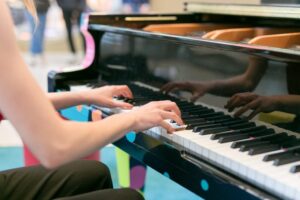 Whether you are an experienced player or starting to learn piano for the very first time, having effective practice strategies is essential for improving your craft. Here are five tips that I emphasize in my Miami piano lessons.
Whether you are an experienced player or starting to learn piano for the very first time, having effective practice strategies is essential for improving your craft. Here are five tips that I emphasize in my Miami piano lessons.
Practice Slowly
We can all be a little impatient sometimes, but practicing new or challenging music at a speed that’s too fast can seriously slow down your progress. In order to play piano at a fast tempo our brains have a lot to do. By practicing a piece or a short section of a piece slowly, we can make sure that we are being intentional about every aspect of our playing. This way we can avoid repeating the same mistakes over and over and actually speed up our progress.
Practice Consistently
Set a goal to practice as many days a week as possible, if not every day. Depending on your playing level this might mean several hours, or it could mean 30 minutes. With really young kids taking piano lessons, Miami Piano Teachers, like me, tell them to practice 5 minutes a day. The important thing is that you are practicing frequently. Consistent practice helps you develop good playing habits and helps you continually build off your previous practice session. You can also use practice techniques that will help improve your piano skills further. I always tell my students that I’d rather they practice for 20 minutes 6 days a week than 2 hours one day. The time is the same, but it’s a world of difference.
Improvise!
Any time we are performing music we want to be in the moment. This is true whether we are making up a rock keyboard solo on the spot or performing classical piano repertoire. Like anything else, being in the moment while playing is a skill that we can practice. One of the best ways to practice it is to improvise. This can be daunting for anyone who is used to only reading notes off the page, but it doesn’t have to be. Improvising can be many things; from putting on a C major backing track and making up melodies with the white keys, to picking a few notes and experimenting with the order and rhythms, to using the entire keyboard and seeing what sounds come out. The important thing is that you are engaging directly with what’s happening in the moment.
Don’t Neglect Warm-ups
Like any instrument, piano is all about fine motor skills. When playing the piano we are engaging muscles and tendons in ways that they aren’t used to. I start most of my piano lessons, as well as my own practice, with simple finger patterns. There are several finger patterns that you can learn as a piano beginner and as with most practice, getting the most out of these exercises is all about repetition and consistency. I tell my students that it really is a lot like physical exercise; start small and work your way up.
Don’t Always Start at The Beginning
While the beginning of a piece of music can seem like a logical place to start while practicing, it can often lead to a final result where the first part of the piece sounds great but the ending is underwhelming. It’s important to give proper attention to every section of a piece of music. In a practice session this may mean starting somewhere in the middle and only playing a few measures at a time until you are confident with them. I like to stress practicing the last phrase of a piece. After all, in a performance that’s the last thing that your audience will hear. Furthermore, learning the music in the middle of a piece first may even make learning the beginning easier. Of course, this depends on the particular piece of music. Taking piano lessons and having a good teacher can help you make these decisions and provide an effective strategy towards learning a new piece of music.
A Great Teacher Can Help
Practice is something you do on your own, but taking lessons with an experienced teacher can help you make your practice more effective. Taking regular lessons means that you will have a consistent goal, frequent feedback on your playing, and tailored practice advice that will address your exact needs. At Lessons In Your Home, our instructors are thoroughly vetted, professional, and passionate about music. Our teachers will come right to your home for every lesson, plus we offer virtual music lessons, too. Our online music lessons are being taught by local music teachers with live lessons tailored to your child! Contact us today to learn more.
By Bryan Dubrow
